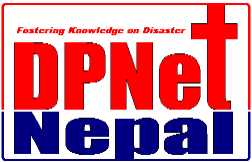NAGARKOT DECLARATION 2003
DP-Net Review Workshop, 21-22 November 2003
Nagarkot, Nepal
Having realized that;
·
Nepal faces disasters of diverse kinds every year resulting into a significant loss of life and property
·
There are various Governmental, Non Governmental, National and International institutions working to cope natural disasters
·
Such institutions have assembled under the umbrella of DP-Net Partners
·
DP-Net has held a two day Workshop in Nagarkot from 21-22 November 2003
A declaration hereafter called Nagarkot Declaration has
been made unanimously by all the partners covering three very important aspects, firstly the need of a suitable plan, secondly
the formation of a viable institution and thirdly the capacity building of such an Institution as follows.
- The existing National Disaster Management Action Plan should be updated in order to fit to the contemporary needs of
the country in a holistic manner along the lines of Total Disaster Risk Management Concept with emphasis on the mobilization
of the community as well as the use of local resources and indigenous knowledge
- An authoritative National Disaster Management Council should be established by the Government with network spread throughout
the country with units in the national, regional as well as local level which will among others integrate the disaster management
activities with Developmental plans and programs.
- The Council thus formed should be strengthened
so that it will be able to raise awareness among the people in general and vulnerable ones in particular through informal
mass scale disaster management training programs as well as formal education in the Schools and the Universities highlighting
on the need of carrying out risk assessment, early warning and vulnerable mapping based on Disaster Management Information
System before any disaster management task is undertaken. The Council should provide guidance towards improving policy, legal
and educational environment for the overall reduction of disasters in the country.
Disaster
Preparedness Network (DP-Net)
Workshop
Report
12-13
July 2002
Nagarkot,
Bhaktapur
1. Background
Because of the vulnerable topographic condition of Nepal,
i.e. young Himalayas in the northern side, it is highly active seismic- zone and mountainous fragile land scope Nepal is one of the disaster prone countries of the world where flood, landslide, earthquake, fire and outbreak
of epidemics frequently occur. If we a glance at the history of disaster in Nepal we find that the earthquake of 1934 (1990
B.S) measured 8.4 in Richter scale. It killed 16,875 people and demolished 318,139 houses. Similarly, the earthquake of 1988
killed 721 people and 21,976 houses were completely distorted. In the flood and landslide of July 1993, considered to be the
biggest ever, 1275 people lost their lives, almost 500,000 people were affected and the development infrastructures worth
about US $ 100 million were destroyed. In average, more than 1,000 deaths a year are caused by disasters in Nepal.
Before 1990 only few voluntary organizations
and some government bodies (RNA, Police, for example) were involved for relief and rescue activities. After the restoration
of democracy in 1990 there is the notable development in NGO sectors. Approximately 40,000 NGOs including non-registered exist
in Nepal at the moment. Some of those are involved in the field of disaster management. Because of remarkable existence of
NGO/INGO and GOs in Disaster Response there is an opportunity to work together as well as the threat of duplication in action.
The actors in Disaster Management field realized a need
of common forum so that the chance of duplication could be avoided and knowledge and resource could be shared. Keeping these
facts in mind, the concept of DP-Net (Disaster Preparedness Network) was incepted in 1998. During this period, this forum
has become able to initiate some good activities but still it has not been able to achieve expected results. So, there is
a dire to revitalize the DP-Net. Therefore, a 2-day workshop was organized in Nagarkot on 12-13 July 2002, in which 35 organizations
working for disaster preparedness participated. (List of participants is given in annex-1.)
2. Objectives
of the workshop
(i)
To share knowledge and experience of disaster management among the DP-Net partners,
(ii)
To make an appropriate frame work of DP-Net for revitalization
3. Date and venue:
12-13 July 2002, Hotel Chautari, Nagarkot, Bhaktapur
a) Opening ceremony
The chief guest, Mr. Ramesh Kumar Sharma, Chairman of Nepal Red Cross Society
inaugurated the workshop. Inaugurating the workshop the chief guest said that NRCS always believes in "power of humanity".
He further added that NRCS gives priority for coordination and participation. He wished for success of the workshop. Mr. Amod
Mani Dixit Founder member of DP-Net and General Secretary of N-Set welcomed the participants. On the occasion Mr. Dixit said
"The DP-Net was born 5 years before but there must have a collective effort to make it mature." He further added "We have
2 days to think about the betterment of DP-Net. We should extract the best out of this workshop.
At that opening ceremony, Mr. T. R. Onta, Executive Director
of Nepal Red Cross Society justified the need of DP-Net. He illustrated some achievements and on-going activities of DP-Net.
He further added that NRCS has developed a questionnaire to collect information of partners that would be helpful to develop
a comprehensive DP plan. Mr. Onta also requested the workshop participants for sincere and wider thinking to bring the new
momentum of DP-Net.
Similarly, Dr. Min Bahadur Poudel Director of Disaster
Management Department, Ministry of Home Affairs, highlighted some of the activities carried out by Ministry of Home Affairs.
He said "No single agency can cope with challenge of the disaster and there should be a collective effort, so that DP-Net
is an ideal forum."
More...





